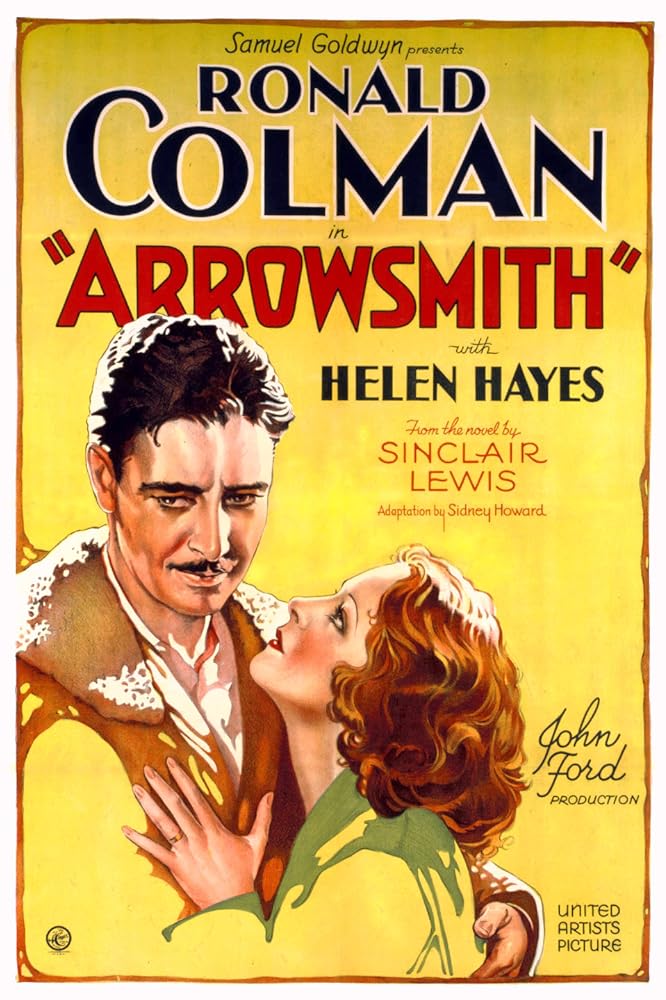
ARROWSMITH
(director: John Ford; screenwriters: Sidney Howard/based on a novel by Sinclair Lewis; cinematographer: Ray June; editor: Hugh Bennett; music: Alfred Newman; cast: Ronald Colman (Dr. Martin Arrowsmith), Helen Hayes (Leora Arrowsmith), A.E. Anson (Prof. Gottlieb), Richard Bennett (Gustav Sondelius), Clarence Brooks (Oliver Marchand), Claude King (Dr. Tubbs), Beulah Bondi (Mrs. Tozer), Myrna Loy (Joyce Lanyon), Alec B. Francis (Twyford); Runtime: 100; MPAA Rating: NR; producer: Samuel Goldwyn; United Artists; 1931)
“Emotionally gratifying, it dramatically only crawls along with so many actionless scenes.”
Reviewed by Dennis Schwartz
Based on Sinclair Lewis’ 1925 Pulitzer Prize-winning novel. Lewis saw the film and reportedly was satisfied with it. This story of a dedicated medical researcher trying to find a cure for bubonic plague who is conflicted if his motives are either steeped in self-glory or for humanitarian reasons has been adapted to the screen by playwright Sidney Howard. The black-and-white film is given a shadowy expressionistic F. W. Murnau treatment by director John Ford (“The Searchers”/ “The Long Voyage Home”/”The Grapes of Wrath”). This is not a great film, too patchy, even though the prestigious film was nominated for four Oscars, including Best Picture.
As a gifted medical student Martin Arrowsmith (Ronald Colman) turns down a chance to do research at the McGurk Institute in New York with the noted Professor Max Gottlieb (A.E. Anson) because he wants to marry his sweetheart Leora Tozer (Helen Hayes), a nurse. After opening up a practice the restless doctor forsakes his dream to be a simple country doctor in his rural Minnesota hometown and takes a job with Gottlieb at the research institute, which he thinks is better suited to his inquisitive nature. He does so after he develops a serum for a fatal cow disease and was influenced by the touring Swedish lecturer Gustav Sondelius (Richard Bennett).
Warning: spoiler to follow in the next paragraph.
At the McGurk, Arrowsmiths pioneering methods bring him welcomed attention. This allows him the opportunity to travel to the West Indies to test out his new serum for the bubonic plague. But he finds undue resistance to his experimental treatment from the white expatriates there who refuse to be inoculated as guinea pigs. Instead he flees with the help of black doctor Oliver Marchand (Clarence Brooks), Harvard-educated, to an isolated island where he gets a chance to inoculate its indigenous population and have an affair with the married Joyce Lanyon (Myrna Loy) who was stuck there because of the quarantine. Leora accompanies him to the contagious area and tragically contacts the disease, leaving him guilt-stricken because she dies alone.
Though it has a few stirring moments and is always dignified in its nobility, it’s too chatty and dull. Undoubtedly emotionally gratifying, it dramatically only crawls along with so many actionless scenes. This 108 minute version restores from the cut 89 minute version the role of Myrna Loy as the temptress. Hayes, known as the First Lady of the American Theater, dramatically cuts into the acting honors from the stalwart Colman with her endearing folksy performance.
REVIEWED ON 4/1/2007 GRADE: B-